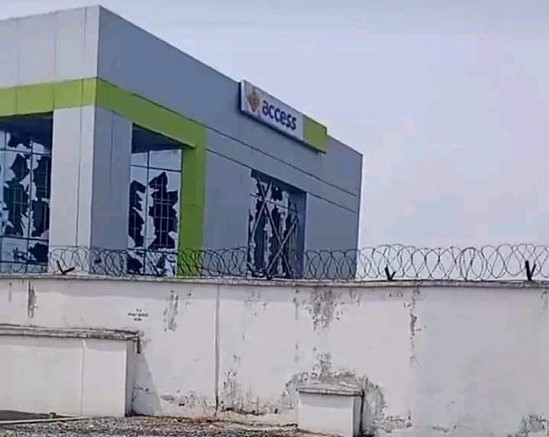As apprehension over the scarcity of new naira notes grows, twelve branches of some commercial banks have been attacked and vandalised by frustrated customers in four states in the last 12 days.
Findings by this newspaper reveal that branches of the banks attacked include Access Bank, First Bank and Union Bank in Warri, Delta State on Wednesday; Owena Bank in Ibadan, Oyo State on February 3; First Bank in Abeokuta, the Ogun State capital on February 7, Sterling Bank, UBA, GTB, Access, Zenith, Stanbic IBTC and others in Benin, Edo State on Wednesday.
21st CENTURY CHRONICLE reports that the mob who attacked the banks on Wednesday were angered due to their inability to access the new naira notes.
The angry mob set a bank ablaze at Udu express junction, Udu Local Government Area of Delta State.
A resident, Martins Alala, said the scarcity of the newly redesigned naira notes and rejection of the old ones as legal tender had put the citizens in a state of dilemma.
Alala said “as I am talking to you now, Access Bank and First Bank ATM are on fire, we have set them ablaze and we are also targeting Ecobank at DSC all the banks must feel what they are doing to us.”
The mob also attacked a branch of Sterling Bank, UBA, GTB, Access, Zenith, Stanbic IBTC and others in Benin, Edo State on Wednesday. Most of the banks are located along the Akpkakpkava where their ATM points and buildings were destroyed. The UBA branch at Upper Sakponba was also attacked, destroying a part of the bank as staff scampered for safety.
In Benin, youths barricaded all roads leading to the popular and ever-busy Ring Road, and headed for the Central Bank branch, but were prevented from gaining access by a combined force of police and military operatives.
On Friday February 3, a branch of Owena Bank in Ibadan, Oyo State, was vandalised by an irate mob protesting naira scarcity.
The protesters barricaded major roads across the state capital and chanted anti-government songs.
Affected routes were Iwo road, Gate and other routes in Ibadan North East local government area.
Some of the angry youths were heard shouting out of frustration in Yoruba language: “lori owo wa” which translates “despite being our money.”
Similarly, on Tuesday, February 7, some hoodlums invaded a branch of the First Bank in Abeokuta, the capital of Ogun State,
Youth went on rampage in protest against the shortage of cash and hike in the price of the premium motor spirit, commonly called petrol.
They were, however, unable to gain access to the banking hall as security operatives dispersed them.
To douse the tension arising from the crises resulting from the policy, President Muhammadu Buhari on Thursday announced that the old N200 notes would remain in circulation until April 10.
He also declared that the N500 and N1,000 notes cease to be legal tender with effect from February 10.
“To further ease the supply pressures particularly to our citizens, I have given approval to the CBN that the old N200 bank notes be released back into circulation and that it should also be allowed to circulate as legal tender with the new N200, N500, and N1000 banknotes for 60 days from February 10, 2023 to April 10 2023 when the old N200 notes cease to be legal tender.
“In line with Section 20(3) of the CBN Act 2007, all existing old N1000 and N500 notes remain redeemable at the CBN and designated points.
“Considering the health of our economy and the legacy we must bequeath to the next administration and future generations of Nigerians, I admonish every citizen to strive harder to make their deposits by taking advantage of the platforms and windows being provided by the CBN.”
On November 23, 2022, President Buhari officially unveiled the newly redesigned naira denominations of N1000, N500 and N200 introduced by the Central Bank of Nigeria (CBN).
Shortly after Buhari unveiled the new naira notes, CBN Governor, Godwin Emefiele, said the CBN is fully poised to make Nigeria a cashless economy.
The CBN governor set January 31, 2023 deadline for the swap of the old Naira notes with new ones, but due to the scarcity of the new Naira notes that became inaccessible and the attendant suffering, the deadline was shifted to February 10 which expired six days ago.
Prior to the February 10 deadline, three state governments, Kaduna, Kogi and Zamfara, dragged the federal government before the Supreme Court to stop the government from going ahead with the deadline.
Consequently, the Supreme Court set February 15 to hear the suit and ruled that the old currency notes remain legal tender until the suit is heard.
However, since the expiration of the extended deadline, there has been confusion and anarch confusion reigned among the people as the CBN has not shifted ground while the Supreme Court order also subsists.
Anarchy continued to reign up to Wednesday, February 15, when the Supreme Court again adjourned hearing in the suit by the governors to February 22, following application by nine more states to be joined in the suit.
The implication of Wednesday’s Supreme Court ruling was that the old notes remain legal tender but out on the streets and in markets, they were being rejected, especially with the stance of the CBN.









